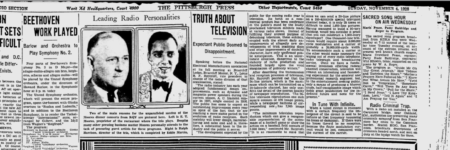Take an author, have them read their story, add music and sound effects to create a narrative soundscape, and presto, you’ve got Storybound. If it sounds simple, that’s because it is. And yet, this simple podcast began netting a million downloads in a matter of months.
“This is probably not a good thing to say, but I generally don’t think about what’s going to resonate with people,” Brewer says.
Storybound is the brainchild of Jude Brewer. Brewer previously had spent two years working on a podcast called Storytellers Telling Stories, which was focused on the Portland, Oregon literature scene. As with Storybound, the concept was authors reading their own work with music underneath, but Brewer had ambitions to expand it to a larger pool of writers (and listeners) beyond the Portland scene. Brewer had been listening to a podcast called Writers Who Don’t Write, which was on a network called The Podglomerate, and wondered if there might be some way he and the network could work together. That’s when he sent a fortuitous tweet to Jeff Umbro, the Podglomerate’s CEO.

Umbro admits that he almost never has time to respond to tweets, but on that day he decided to give the show a listen. “I loved it,” Umbro tells Timber. “And it aligned with a show I had been wanting to make for years. I happened to have been speaking with Lit Hub earlier that week about a potential collaboration, so the timing was perfect and the stars kind of aligned.”
For those who don’t know, the Podglomerate is a company that produces and distributes podcasts, and it’s got a pretty serious reach. Podcasts launched by the Podglomerate have been featured on every major podcasting app as well as major news publications. .Literary Hub (or Lit Hub, if you’re into brevity) is a highly respected resource for all things literature, with deep ties to bookstores, small publishers, and massive publishing houses. With these two companies now behind him, possibilities really began to expand for Brewer. Between Lit Hub’s incredible access to authors and the Podglomerate’s engineers and publicity, things took off quickly when Storybound launched in December 2019.
“There were more doors that could open with Lit Hub attached,” Brewer tells me. “And Podglomerate does the brunt when it comes to reaching out and knowing who to talk to… but both Lit Hub and Podglomerate have a very wide reach. They have built-in audiences, they have a newsletter, they have a channel that they’ve built over a period of years.”
I assumed this meant a lot of cross-promotion within the Podglomerate network, but Brewer told me that in general that isn’t the case. “I actually haven’t spent a lot of time promoting other Podglomerate or Lit Hub shows, and they haven’t really spent a lot of time promoting ours,” he says. “It’s been on a couple feeds, but we’re looking out to other networks, actually, and helping them promote their literary-based shows. Shows that may be similar to ours, actually… It’s fun to grow that out because in a way it allows Storybound to take on more of a defined shape as we start understanding our place within the dramatic podcast community.”
Having a team behind him also enabled Brewer to focus more on his strengths. He will be the first to tell you that he is not the best sound engineer, but he’s now been able to outsource those duties to experts who are really good at what they do, and that enables him to put more energy into the direction and the crafting of the episodes. This includes learning how to better direct the voice talent (whether they’re actors or the writers themselves) and also how to balance music and sound effects with the cadence of the different readers. Some voices, he found, can be easily overwhelmed by the music, while others are so naturally powerful that you can add a lot of sound effects and it still won’t detract. It’s these nuances that really give Storybound its signature character.

Brewer’s first podcast, Storytellers Telling Stories, had amassed about 50,000 downloads over the course of two years. It was modest, but he was proud of the niche following he generated. Storybound reached nearly one million before its second season began to air in July 2020.
“At the beginning, I was checking how many downloads we were getting because I was thinking, ‘Okay, we’ll see how many plays this really gets,’” Brewer says. “And then once, within a week or so, we’d surpassed everything I’d done before, I was like ‘alright, that’s cool,’ and then I kind of let it be. I let Jeff and Lit Hub focus on that, because I didn’t want to think about it too much. Don’t get me wrong, I really like knowing that people are listening! I just want to make sure I keep focused on the actual process itself.”
He does, however, read the comments on platforms like iTunes, and he takes that feedback seriously. He even takes it kind of hard sometimes, he admits. When people complain about the music or sound effects being a distraction from the story, he’s tried hard not to take it personally, since he selects them himself, but ultimately he found it valuable to hear what is and isn’t working for his audience. Sometimes he bears that in mind, while in other cases he decides to stick to his guns and trust his own instincts.
The tipping point for Storybound came approximately one month in. The New York Times put it on a list of recommended podcasts, as did The AV Club, and the Bello Collective. A noticeable uptick in audience followed those stories, but perhaps more significant was what happened next.
“The editorials definitely helped, but what really hit hard was when we got featured on all these different platforms,” Brewer says. “Apple featured us, and then Castbox featured us, and then Spotify. All these different podcast apps were featuring us, and you could see our banner on the wheel when you sign in. And that was kind of trippy, seeing our name featured there in the main feed. And that to me is when things started to feel very real, and we definitely noticed an increase in audience. I think it really helps to have that exposure.”
If you’re wondering if all that was organic, it turns out that it’s a mixed bag.
“It was a combination of trying to get in front of them and also just luck,” Brewer says. “We lucked out that we had an audience that actually did leave reviews. We had an audience who did listen to all of the episodes. I think those analytics help a lot for podcasts to get featured. If they see episodes are mostly getting listened to, or that they’re having that much activity, then I think that’s usually when they feature, and I think we slipped under whatever qualifications there were and it was just enough.”
So, if you’ve ever wondered if it’s really worth it to encourage your listeners to leave reviews on your podcast, this is strong evidence for the affirmative. But, of course, you still need to make a show that resonates with people in the first place. Brewer thinks that’s best done not by constantly trying to get a read on what your audience wants (in terms of the types of stories being selected, as well as the way they get told), but by staying true to what you, as a listener, would want to hear yourself.
“This is probably not a good thing to say, but I generally don’t think about what’s going to resonate with people,” Brewer says. “I generally think of what’s going to resonate with me. I try to treat my ears first and foremost, and then once it leaves me, there’s a reason why I want to have other people working on the show aside from myself.”
Brewer points to having trusted partners on the production side. Assistant mixer Tim Karplus can nail the technical aspects that Brewer himself might not be able to pull off as cleanly (or at least as quickly), to get the story to sound as close to his vision as possible. Once that’s done, it’s passed to the Podglomerate’s Jeff Umbro for final notes. Having a second and third set of ears that he trusts deeply allows Brewer to proceed confidently, and from there he tries to let it go.
Storybound is currently in the middle of its second season, and has already begun booking for its third. Brewer is eyeballing potential video collaborations with some YouTube creators who he admires, so we may see a visual version of the podcast in the future, but for now he’s focused on how to keep the podcast fresh.
“I always want to ask, ‘what have we not done before?’” Brewer says. “Or what are the kinds of stories that we haven’t featured yet? What corner has our show not explored? So for me, it’s interesting as long as I’m doing something that I haven’t done with it. This podcast can go on as long as we want it to, and it can continue to grow and adapt. Who knows, in a few years it may sound completely different from where we’re at now, as long as we’re just following what interests us.”
Take a listen to Jack Rhysider — a podcaster featured in another Timber story — read his story “The Old Church of St. Louis” in the first season of StoryBound




Comments